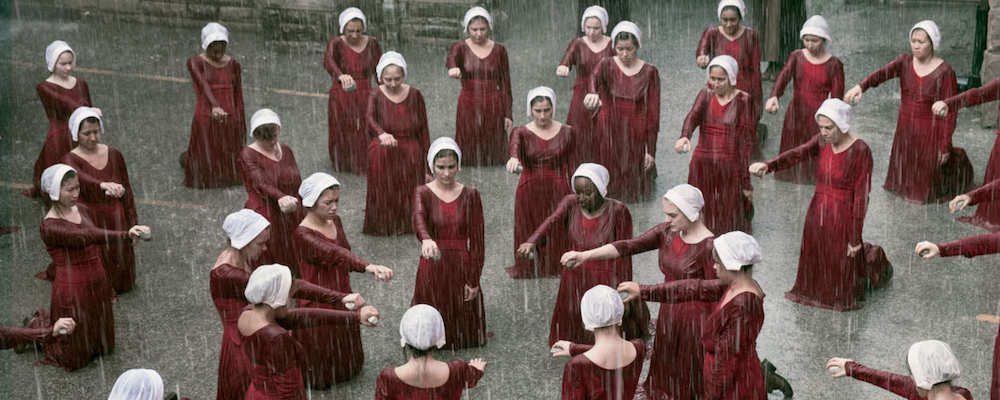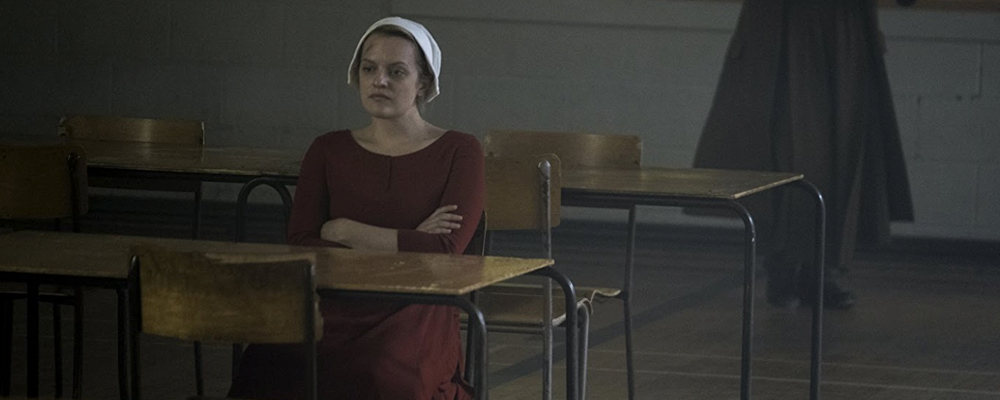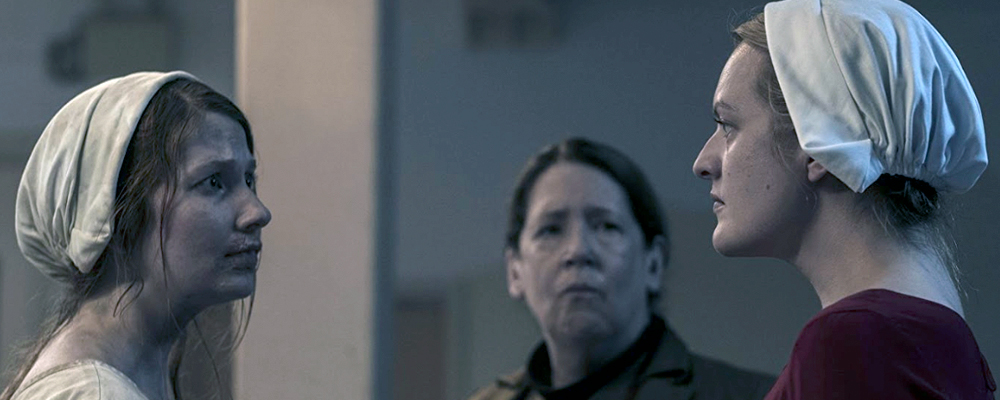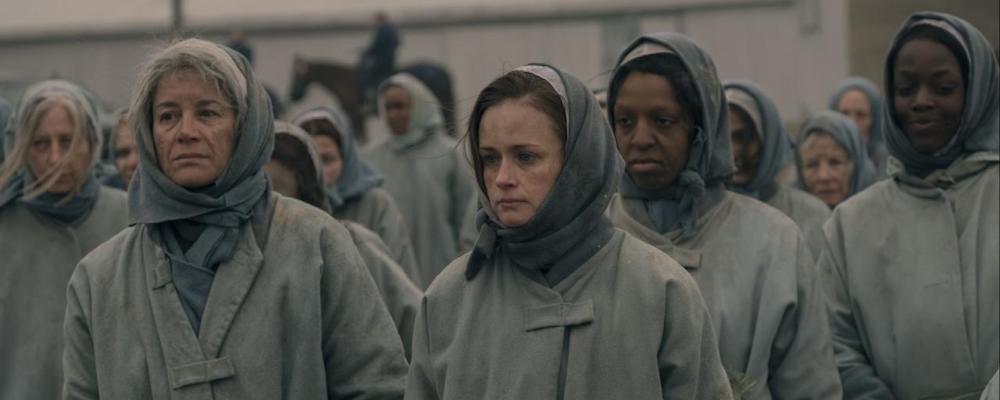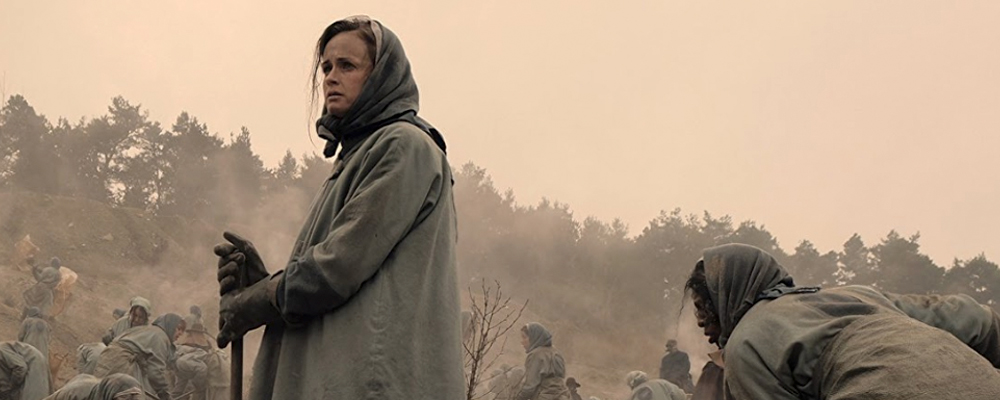‘The Handmaid’s Tale’ Season 2 Gets Darker While Remaining Alarmingly Relevant
Alci Rengifo
“The Handmaid’s Tale” returns for a second season that takes a bit of a gamble. The first season of Hulu’s acclaimed, Emmy-winning series covered the original premise of Margaret Atwood’s classic novel, bringing its frightening dystopia to life with visceral detail. It ended in the same fashion as the book, with our heroine June Osborne (Elisabeth Moss) seeming to escape her confinement. Season 2 imagines what happens after June flees, spinning a new vision that manages to stay just as disturbing and relevant. Now June finds herself in a terrain where her body may be her salvation, but of course under this regime a woman must fight to even have a say on the rights of her very being.
We are back in the theocratic future of Gilead, in what used to be the United States. As the season opens, June and the other handmaids are now suffering the consequences resulting from their refusal to stone fellow handmaid Janine (Madeline Brewer). While the others face torture under the instructions of Aunt Lydia (Ann Dowd), June is spared for one reason: She is pregnant. This makes her highly valuable because it is believed she is carrying the child of her assigned, elite overseer, Commander Fred Waterford (Joseph Fiennes) and his sterile wife and former conservative media figure, Serena (Yvonne Strahovski). But June manages to escape with the help of her secret lover and Waterford’s driver, Nick (Max Minghella). It is not hard to assume her child is actually Nick’s. As June is taken to a hideout by apparent members of the underground resistance against the Gilead order, she is haunted by past memories of her daughter Hannah (Jordana Blake) and husband Luke (O-T Fagbenle). We learn more and more about the events that led to June’s capture and transition into a handmaid, as well as the apparent terrorist attack that paved the way for the Gilead takeover. Meanwhile in one of the distant, noxious colonies, another rebellious handmaid, Emily (Alexis Bledel) does hard labor, also losing herself in memories of the past as the present grows ever so bleak.
Having already covered the novel that serves as its source material, “The Handmaid’s Tale” is now free to imagine a fresh narrative that flows out of the original. Atwood herself has reportedly been heavily consulted on what road the story should take and it shows. The opening episode, “June,” has moments of cinematic power fueled by a story full of anger and universal relevance. In an early scene the handmaids are paraded to gallows in the rain, inside a sports stadium as Kate Bush’s “This Woman’s Work” plays on the soundtrack. There are subtle details that feel so authentic and plausible they are chilling. Consider an early flashback where June reminds Luke that a woman needs a husband to co-sign paperwork in order to get birth control. In another flashback Emily and her wife and child are blocked from entering Canada by guards who speak in a cold, definite bureaucratic language laced with religious subtext. To be gay in this world is akin to a federal crime. Atwood’s novel was published in 1985 as the religious right was in ascendance in national politics. Hulu’s adaptation now arrives amid new cultural debates and fierce political clashes. By adding new layers to the story in such an intelligent way, the showrunners are proving how timeless this tale truly is. The backstory of June’s mother, Holly (Cherry Jones) is greatly expanded. We see her raising June in a radical, feminist household where activists hang out. In one powerful memory Holly takes June to a meeting where women burn pieces of paper containing the names of their rapists. In a beautifully searing line, June recalls noticing just how many names were being thrown into the fire. “The Handmaid’s Tale” wears its politics on its sleeve, but in a way that recalls the great political dramas that used to be more common in cinema. Amid a landscape of much vapid entertainment, this is a show not afraid to clearly say urgent things.
As just a thriller this is a superbly well-crafted series. In a dystopian world where a right-wing theocracy rules over all, suspense is generated from June’s attempts to simply have control over her life and body. There is an undercurrent of silent, boiling conflict between her and Serena. A scene of strange, almost farcical tragedy occurs when Serena’s friends throw her an oh so bourgeoisie baby shower, for the child June is the one carrying. When Serena mentions that she has not seen the baby kick yet, June announces that she in fact has felt the baby move. This culminates in a battle of wills acted with cutting rage by Strahovski. Another scene during which June is examined by a gynecologist is eerie in its tone, because it perfectly captures how she is but a mere specimen in this world. There is action of course, including some exciting chase scenes when June seems close to final freedom. There are betrayals, cryptic messages delivered through glances and sudden revelations. Powerful social commentary is combined with the kinetic energy of a page turner. Does Nick truly love June? It seems so, but can love even survive in a world where a woman’s body is turned into a mere breeding apparatus, supervised and controlled by a reactionary clique? This series places truly harrowing dilemmas upon its characters.
Visually this is a masterwork when it comes to evoking another reality. Scenes of prayer, especially in the Waterford home, have an ominous ambiance, as the old Puritan world had returned. The colony where Emily is forced to do slave labor is lit and framed like a work by Hieronymus Bosch. Women in gas masks supervise the workers, dressed in attire fit for nuns. The effect is like a cross between the Middle Ages and the trenches of World War I. What this series does is fully conjure an imagined future that feels fully totalitarian. Everyone speaks in a rehearsed set of greetings and manners infused with a religious tinge. In a powerful statement regarding the loss of knowledge in a world gone mad, June is temporarily hidden in the now abandoned offices of the Boston Globe. At one point she finds a space with a bullet-riddled, blood-stained wall where executions took place. Even a moment where she watches an old episode of “Friends” on a laptop in the newspaper offices has a haunted quality, like an artifact from some distant civilization.
Yet “The Handmaid’s Tale” is not without complexity in all its characters. Momentarily free, June still finds it in herself to light candles and pray. In the colony Emily sees fellow prisoners still clamor to some higher power, even as they are imprisoned by a government claiming to represent a righteous order. Faith versus a perversion of belief systems, the freedom to believe versus the oppression of radical believers, all are themes well explored in this season. Elisabeth Moss evokes it all with another endearing performance, vibrant with uncertainty and independence, fear and a force of will. Ann Dowd will also surprise some with turns her character takes. New dimensions are revealed in Aunt Lydia, showing how even villains are but merely human.
The second season of “The Handmaid’s Tale” veers into darker waters, but with the same, provocative ideas that helped its predecessor win the Emmy and Golden Globe for “Best Drama Series.” To watch good TV that entertains can be fun and rewarding, but to watch a series pulsating with real ideas combined with genuine artistry is truly enriching.
“The Handmaid’s Tale” Season 2 premieres April 25 with new episodes airing Wednesdays on Hulu.

